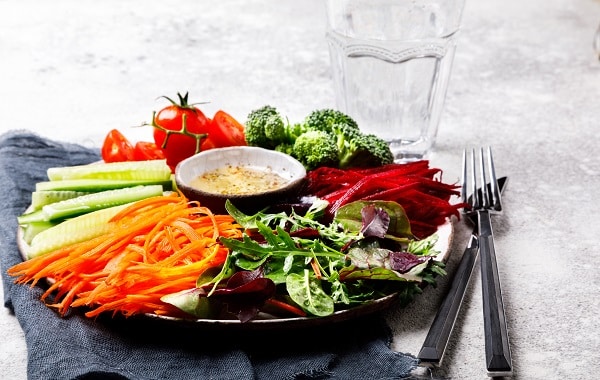The human Digestion system is a complex and vitally important network that helps the body to break down food, absorb nutrients, and eliminate waste. The system begins with the mouth, where food is chewed and mixed with saliva, which contains enzymes that break down carbohydrates. The food then passes through the esophagus to the stomach, where acids and enzymes further break it down.
From the stomach, food moves into the small intestine, where most nutrient absorption takes place. The intestine absorbs water, vitamins, minerals, and other nutrients from the food before passing it on to the large intestine. In the large intestine, more water and vitamins are absorbed, and wastes are eliminated in the form of feces.
The digestive system is a vital part of the human body and is essential for good health. Without proper digestion, our bodies would not be able to absorb the nutrients we need to function correctly. This article will discuss simple ways to improve your digestion.
Contents
- 1 Eat Smaller Meals More Often
- 2 Drink Plenty Of Fluids, Especially Water
- 3 Avoid Processed Foods To Improve Your Digestion
- 4 Get Adequate Sleep Each Night
- 5 Reduce Stress Levels As Much As Possible
- 6 Exercise Regularly To Improve Your Digestion
- 7 Eat A Lot Of Fruits And Vegetables
- 8 Start Improving Your Digestion Today!
Eat Smaller Meals More Often

The human digestive system works best when food is consumed in small, frequent meals. When we eat large meals, our bodies must work harder to break down the food and absorb the nutrients, leading to indigestion, gas, and bloating. It can also put a strain on your digestive organs, which can lead to long-term health problems.
By contrast, when we eat smaller meals more often, our bodies can digest the food more efficiently; it helps to improve our digestion in the short term and can also help reduce our risk of developing digestive problems. So next time you feel hungry, reach for a snack instead of a full meal. Your body will thank you for it!
Drink Plenty Of Fluids, Especially Water

Drinking plenty of fluids is vital for many reasons. Not only does it help to flush out toxins and keep your digestive system moving, but it also helps to prevent dehydration. Dehydration can lead to headaches, fatigue, and even dizziness. And, of course, staying hydrated is important when exercising or working in the heat. But what’s the best fluid to drink? While there are many options available, water is always a good choice. It’s calorie-free and sugar-free, and it contains no additives. Plus, it’s readily available and easy to transport. So next time you feel thirsty, reach for a glass of water instead of sugary soda or fruit juice. Your body will thank you for it.
Avoid Processed Foods To Improve Your Digestion

The digestive system is a complex network of organs and tissues that breaks down food into nutrients the body can absorb. When this process is disrupted, it can lead to various problems, including indigestion, heartburn, and constipation. One common cause of digestive problems is processed food. These foods are often high in fat and sugar, which can trigger inflammation and contribute to gastrointestinal disorders.
In addition, processed foods often lack the fiber and other nutrients that are essential for proper digestion. Avoiding processed foods can help improve your digestion and reduce your risk of developing digestive problems. Instead, focus on eating whole, unprocessed foods rich in fiber and other nutrients. These foods will help to keep your digestive system functioning properly and improve your overall health.
Get Adequate Sleep Each Night

A good night’s sleep is essential for many reasons. It helps to rest the mind and body, allowing them to heal and recover from the day’s events. In addition, sleep allows the body to perform essential functions such as regulating hormones and clearing out toxins. The benefits of sleep are especially important for people who have a lot of stress in their lives.
Chronic stress can lead to various health problems, and getting enough rest is one of the best ways to combat this. In addition to helping the body heal, sleep also aids in digestion. When we are tired, our bodies have a harder time breaking down food properly, leading to indigestion, heartburn, and other digestive problems. Getting enough sleep helps to prevent these issues and can improve overall health.
Reduce Stress Levels As Much As Possible

The human digestive system is a complex and sensitive network of organs that can be easily disrupted by stress. When stressed, our bodies produce cortisol, a hormone that slows digestion and can lead to stomach cramps, indigestion, diarrhea, and constipation. Stress can also aggravate conditions like irritable bowel syndrome and ulcers. In addition, the immune system is compromised when we are under stress, making us more susceptible to gut infections.
The good news is that we can do many simple things to reduce our stress levels and keep our digestive system healthy. Regular breaks during the day to relax and recenter yourself can help lower your overall stress levels. Staying hydrated and eating a healthy diet full of fiber-rich foods can also help to keep your digestive system running smoothly.
Exercise Regularly To Improve Your Digestion

Most people know that exercise is essential for overall health, but few realize that it can also play an important role in digestive health. For example, exercise helps to move food through the digestive system and prevents constipation. In addition, regular physical activity helps to reduce inflammation throughout the body, including in the digestive tract, which can help to relieve symptoms of conditions like Crohn’s disease and ulcerative colitis.
Furthermore, exercise can boost good gut bacteria levels, which can help improve nutrient absorption and immunity. Therefore, it is clear that there are many benefits to exercising regularly, both for digestion and overall health.
Eat A Lot Of Fruits And Vegetables

The digestive system is responsible for breaking down the food we eat and extracting nutrients that the body needs to function. But for the digestive system to work correctly, it needs a steady supply of healthy food. That’s why eating a diet that is rich in fruits and vegetables is so important. Fruits and vegetables are full of fiber, which helps to keep the digestive system moving.
They also contain vitamins and minerals that support gut health. In addition, eating a diet that includes plenty of fruits and vegetables can help to reduce the risk of developing digestive problems such as constipation, diarrhea, and Irritable Bowel Syndrome. So if you want to improve your digestion, fill your plate with plenty of fresh produce.
Start Improving Your Digestion Today!
While there are many factors beyond your control that can affect your digestion – such as genetics, medications, and underlying health conditions – there are also many things we can do to encourage healthy digestion. From making sure we’re drinking enough water to choosing foods that are easy to digest, paying attention to your digestive health is an important part of overall wellness. And the good news is, by making some simple changes in your daily routines, we can often improve your digestion starting today!


